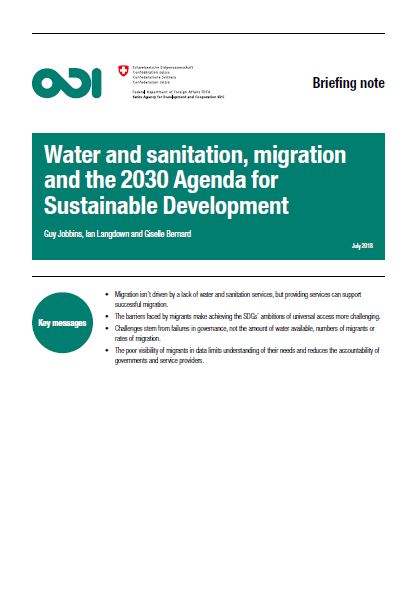Water and sanitation, migration and the 2030 Agenda for Sustainable Development
 |
rapport Jul 2018 ; 16 pages
Aut. Giselle Bernard & Guy Jobbins &
Ed. ODI - London
Téléchargeable sous format: PdF
Téléchargeable chez l'éditeur
Page de présentation d'un éditeur
Abstract:
This briefing considers the impact of migration on a variety of WASH-related Sustainable Development Goals (SDGs), chiefly SDG 6: 'to ensure availability and sustainable management of water and sanitation for all'. While water and sanitation do not appear to drive migration, the process of migration can radically shape access to water and sanitation services – particularly for undocumented migrants and people in transit. We question whether attaining 'universal access' is possible without specific measures to address the needs of refugees and other migrants.
Key messages
- Migration isn’t driven by a lack of water and sanitation services, but providing services can support successful migration.
- The barriers faced by migrants make achieving the SDGs' ambitions of universal access more challenging.
- Challenges stem from failures in governance, not the amount of water available, numbers of migrants or rates of migration.
- The poor visibility of migrants in data limits understanding of their needs and reduces the accountability of governments and service providers.
Mots clefs: |
migration (CI) (DT) (OP) (ope) , ODD Objectifs Développement Durable (CI) (DT) (OP) (ope) , services essentiels (CI) (DT) (OP) (ope) |
Editeur/Diffuseur: |
|
ODI
-
Overseas Development Institute - London - Royaume Uni |
En cas de lien brisé, nous le mentionner à communication@pseau.org